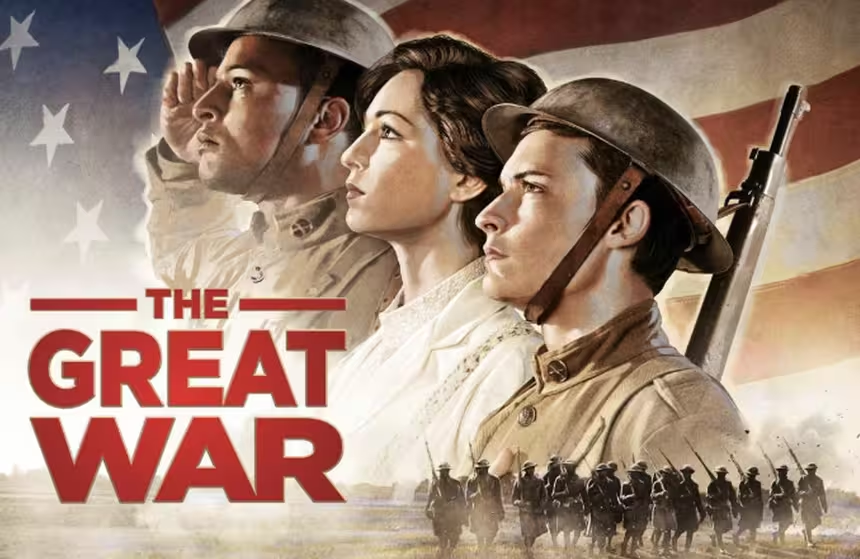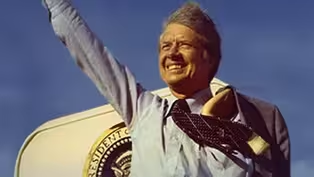
Chapter 1 |The Presidents: Jimmy Carter
Clip: Season 15 Episode 1 | 10m 42sVideo has Closed Captions
Watch a preview of Jimmy Carter.
Watch a preview of Jimmy Carter.
Problems playing video? | Closed Captioning Feedback
Problems playing video? | Closed Captioning Feedback
Corporate sponsorship for American Experience is provided by Liberty Mutual Insurance and Carlisle Companies. Major funding by the Alfred P. Sloan Foundation.

Chapter 1 |The Presidents: Jimmy Carter
Clip: Season 15 Episode 1 | 10m 42sVideo has Closed Captions
Watch a preview of Jimmy Carter.
Problems playing video? | Closed Captioning Feedback
How to Watch American Experience
American Experience is available to stream on pbs.org and the free PBS App, available on iPhone, Apple TV, Android TV, Android smartphones, Amazon Fire TV, Amazon Fire Tablet, Roku, Samsung Smart TV, and Vizio.
Buy Now

The Great War
Discover how WWI transformed America through the stories of those whose participation in the war to “make the world safe for democracy” has been largely forgotten.Providing Support for PBS.org
Learn Moreabout PBS online sponsorshipJIMMY CARTER: I promised you four years ago that I would never lie to you, so I can't stand here tonight and say it doesn't hurt.
About an hour ago, I called Governor Reagan in California and I congratulated him for a fine victory.
I look forward to working closely with him... DAN CARTER: All his life he believed that if you worked hard enough at it, understood the issues, mastered information, then you would come out first.
I said to him, "It must have been hard to turn over the keys to Ronald Reagan," and he said, "You don't know how hard it was."
NARRATOR: On January 20, 1981, after one of the most humiliating defeats in American political history, President Jimmy Carter returned home to Plains, Georgia, to what he called, "An altogether new, unwanted and potentially empty life."
ROSALYNN CARTER: He really was better than I was when we came home because, um, I was so depressed about it that he was always trying to prop me up.
(crowd cheering, applauding) NARRATOR: Four years before, he had stunned the nation.
(cheering) PATRICK CADDELL: Going from total anonymity to being president of the United States in less than 12 months is unprecedented in American history.
If it weren't for the country looking for something in '76, Carter could never have gotten elected.
DOUGLAS BRINKLEY: He offered a biography of what we wanted to hear-- a farmer, Main Street values, Plains-- and he carried that message through.
It was the right message at the right time.
CARTER: Our commitment to human rights must be absolute.
NARRATOR: He had promised a new beginning, to heal the wounds of Watergate and Vietnam-- a government as good and decent and compassionate as the American people.
(crowd chanting) But events would overwhelm him-- an energy crisis, inflation, an Islamic revolution, and 53 Americans held hostage 444 days.
Carter came to be regarded as a good and decent man who was in over his head.
ELIZABETH DREW: He's a very, very smart man and very well-intentioned, but feel... feel is very, very important in politics, especially in a president, and Carter just didn't have very much of it.
What he had was a moral ideology and the issues where he proved successful-- the Panama Canal treaties, the human rights crusades, peace in the Middle East-- those were issues where his moral ideology guided him.
In a nation that was proud of hard work... NARRATOR: "Carter was one of the more exasperating men ever to claim the White House," one journalist said.
"His tenacity, so admirable, could shift to stubbornness, "his religious faith to self-righteousness.
His brilliant mind could be bound up by intricate details."
Many times the one argument that I would find would ruin a person's case is when you'd say, "This is good for you, politically."
He didn't want to hear that.
He didn't want to think that way and he didn't want his staff to think that way.
He wanted to know what's right.
BRINKLEY: This is one of the most highly ambitious people you'll ever meet.
I mean, you don't make it from Plains, Georgia, to the White House just on charm.
But what makes him complex is he's got that kind of hubris and arrogance and also this Christian humbleness, and that's the battle he's constantly finding himself in.
NARRATOR: "As a child, my greatest ambition was to be valuable around the farm and to please my father," Jimmy Carter wrote of his boyhood in rural Georgia.
"He was the center of my life and the focus of my admiration."
DAN CARTER: I can't believe that Jimmy Carter ever felt lost, in the sense that he didn't know where his place was in the world.
And a lot of that comes from his father, who not only was a well-respected, powerful figure in the community, but I think had a real sense of who he was.
And that certitude and self-confidence was something that his son, I think, absorbed unconsciously.
NARRATOR: By the standards of southwest Georgia, Earl Carter presided over a small empire.
A staunch segregationist, he owned some 350 acres of land where he planted corn, cotton and peanuts, employing more than 200 workers at harvest time.
Five sharecropper families, who depended on him for their survival, lived year-round at his farm in Archery.
Carter's mother, Lillian, was an avid reader, loved traveling and was known to enjoy a sip of bourbon.
She put in long hours as a nurse at a nearby hospital and devoted much of her free time to helping sick neighbors.
She got paid in chickens and vegetables and that kind of things because she really helped and felt called to help those that had less than her, and I think she instilled that in all of her children.
ROSALYNN CARTER: She was the only person in Plains who would take up for Abraham Lincoln if he was ever brought up.
Today it's unbelievable to think about that, but back then it was just a way of life, and we never thought anything... we never thought it was really wrong.
NARRATOR: Lillian set for Jimmy the example of service to others.
Earl put the steel in his character.
BETTY GLAD: He was very demanding.
He expected his children to be the very best, and, um, in some ways they all had that built into them.
NARRATOR: "I never remember him saying 'good job' when I did my best to fulfill his orders," Jimmy later said.
"The punishments he administered remain vivid in my memory."
(train whistle blows) A short distance from the Carter farm was Plains, Georgia-- population 600-- the only place for miles to get a cup of coffee, a haircut, buy or sell goods.
It is the place Jimmy Carter always called home, where as a child he went to the all-white Baptist church on Sundays and where he attended the all-white public school.
DAN CARTER: Everybody knew that he was special.
He was somebody different, smarter than, worked harder than, did more than, ceaselessly working at improving himself, even as a child.
NARRATOR: Jimmy made all "A"s. He played basketball and joined the book lover's club, read Shakespeare's King Lear, Ben-Hur, The Hunchback of Notre Dame.
He dreamed of joining the Navy.
His uncle Tom Gordy had excited his imagination with tales of adventures, and postcards and gifts from exotic, faraway places.
In June 1943, at age 18, the farm boy from Plains was admitted to the U.S.
Naval Academy at Annapolis-- the first Carter ever to leave Georgia to pursue a higher education.
ROSALYNN CARTER: Jimmy's sister Ruth was my best friend and she had a picture of him on the wall in her bedroom.
I just thought he was the most handsome young man I had ever seen.
One day I confessed to her that I wished she would let me take that photograph home, because I just thought I had fallen in love with Jimmy Carter.
NARRATOR: Rosalynn Smith was shy, a dedicated student, read the Bible daily and went to church on Sundays.
Her mother once described her as a girl who could wear a white dress all day and keep it clean.
E. STANLY GODBOLD: She was very bright.
She was a reader.
She liked to look at maps.
She was always interested in seeing the world and, uh, she always wanted to get away.
ROSALYNN CARTER: I went to a meeting at the church and I was standing outside and Jimmy drove up with Ruth and her boyfriend, got out of the car and came up and asked me to go to the movie.
He kissed me good-bye.
I was thrilled to death, and then we started corresponding and, uh, by the time Christmas came, I was swept off my feet.
NARRATOR: One month after his graduation from Annapolis, Jimmy and Rosalynn were married.
She was 18, he was 21.
Preview: S15 Ep1 | 30s | Jimmy Carter traces the ascent of an ambitious country boy to the Oval Office. (30s)
Providing Support for PBS.org
Learn Moreabout PBS online sponsorshipSupport for PBS provided by:
Corporate sponsorship for American Experience is provided by Liberty Mutual Insurance and Carlisle Companies. Major funding by the Alfred P. Sloan Foundation.


















